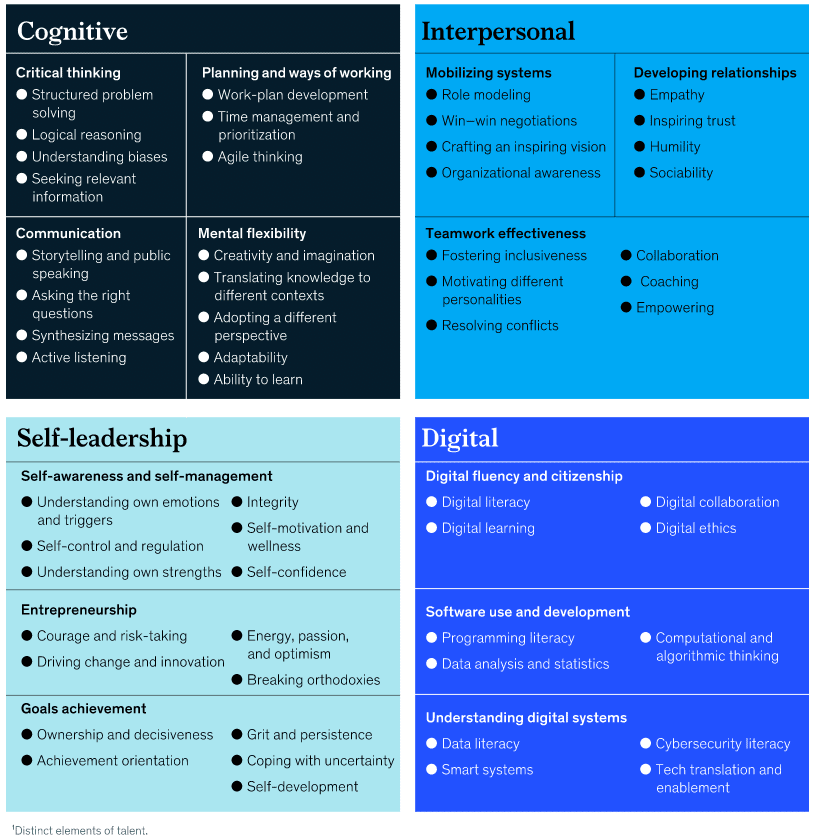Believe it or not, digital skills have been necessary for the workplace for decades. For as long as there have been computers, servers, and electronic communications, there has been a need for digitally inclined professionals, like IT specialists and employees who can safely eject a floppy disk.
Digital skills are defined as the ability to find, evaluate, use, share, and create content using digital devices, such as computers and smartphones.
These days, the digital skills required in the workplace are a bit more advanced, and companies expect the vast majority of their employees to have them, not just a select few. Technology is at the center of our lives, and as our dependence on the internet and digital communications increases, our workforce must keep up with the evolving skill demand.
Why Learn Digital Skills?
Digital transformation is on the rise and affecting every industry imaginable.
Farmers are no longer merely sowing seeds and harvesting a crop; they’re using sensors and information technology to automate, monitor, and regulate their systems to become more profitable, efficient, and sustainable.
Food delivery apps now help restaurants provide their menu options to hungry patrons without them having to leave their homes. This adds a complex layer of responsibilities for restaurant workers who now must manage orders through digital devices, as well as any in-person interactions.
Even real estate, a traditionally face-to-face industry, relies on digital skills. Virtual walk-throughs are available to prospects looking to relocate, and signing documents remotely with services like DocuSign is a quick and convenient way to finalize an agreement.

The mass shift to online business operations in recent years further accelerated the need for digitally literate workers who could help traditional businesses successfully transition to and grow in an e-commerce world.
Without a firm command of digital skills, there is no way to propel innovation and remain competitive. Employers realize this, so they’re prioritizing candidates who can showcase their digital literacy. By developing better digital skills, employees have a chance to contribute to their communities, future-proof their careers, and explore a wide range of professional opportunities.
Here are some statistics showing the increasing demand for digitally literate professionals:
- 24% of employers think finding employees with the right skill set will remain their biggest challenge over the next five years.
- 50% of all employees will need reskilling in the next five years.
- 85% of Americans believe that digital skills will be important to success in today’s workplace.
- According to a study published about digital skills for career progress, “the number of jobs requiring digital skills is predicted to increase 12 percent by 2024.”
- 94% of business leaders expect employees to acquire new skills on the job.
What Skills Are Necessary for Entry-Level Positions?
When you stand out in the modern workplace, you improve your chances of excelling in your career. Whichever career path you choose, keep in mind that there are always new skills to learn and new technologies to master.
For entry-level positions, the bare minimum digital skills required include the ability to carry out tasks, such as:
- Communicating via email
- Researching information online
- Handling sensitive information in virtual ecosystems
- Safely using cloud-based collaboration tools like Google Drive, DropBox, and Microsoft Teams
- Creating and managing spreadsheets and online documents
- Basic device management like connecting to the internet or installing software updates
- Screen sharing during a video call
- Using online calendars and efficiently managing your schedule (and possibly others on the team)
What Are the Critical Digital Skills?
Depending on your career trajectory, you may need additional skills that pertain to your specific role. Digital skills in the workplace can include original content creation, e-commerce, network and information security, UX/UI design, digital marketing, social media marketing, and data analytics.
Advanced digital skills range from data visualization and basic programming skills to data engineering. While these may be more advanced, you can obtain them with hands-on training and consistent exposure.
McKinsey research has identified foundational skills that will “help citizens thrive in the future of work,” below is a sample of their findings.

Which Digital Skills Do I Need?
According to Investopedia, “many of the highest-paying jobs are positions that require a significant amount of education, professional training and advanced skills.” If you want to cover your bases as quickly as possible, here is how you can determine which digital skills you should focus on building.
- Research the industry or profession you’re curious about and read through job descriptions to understand which skills you already have and which you will need to build.
- Understand how you can add value outside of automated systems and AI. As automation becomes the norm, our roles must adapt to the digital environment.
- Join LinkedIn groups in your desired industry to keep tabs on trends and what skills professionals are talking about. LinkedIn groups are also a great place to build your network and ask real professionals your burning questions.
How to Develop or Improve Digital Skills
Almost a third of the workforce lacks the foundational digital skills employers are looking for, meaning a large population of professionals need reskilling. According to weforum.org, those who are unemployed have placed a greater emphasis on learning digital skills, including information technology and data science.
Whether you’re looking to sharpen your digital skills or you’re hoping to enter the workforce with a strong resume, you can benefit from further training. Here are some methods for developing digital skills that don’t include attending a traditional four-year program.
Self-Learning: We’ve talked all about how technology is part of our lives, so we must acknowledge how critical it is in helping us learn. There is a vast amount of information on any topic you can think of online, making basic skills easier to acquire. Connecting with professionals in your field is another great way to supplement your self-learning and understand which skills need more refining.
Free Online Courses: For a more structured experience, you may want to explore free online courses that let you learn at your own pace at a slightly deeper level than self-learning. You may not get all of the advanced material you need to land your dream job, but it’s a step towards gaining basic knowledge and essential digital skills.
Certificate Programs: Universities, like UNLV, offer dedicated certificate programs that deliver intense, in-depth instruction to ensure students are equipped with the digital skills and training to get them hired in today’s workforce. Our cybersecurity bootcamp and software development bootcamp offer accelerated courses led by industry experts and help you find the right job for you with professional career coaching. You can even increase your professional visibility with our exclusive hiring partner network.
The need for digital skills will only increase, so if you need to gain skills fast, there’s no better time to get started than now! Learn more about the UNLV Digital Skills Bootcamps by getting in touch with our admissions advisors. They’ll walk you through your options as you discuss your career goals and educational needs. You don’t have to commit right away. You can test-drive our program for 30 days to get a feel for our learning environment before making up your mind. The future is here. Let’s conquer it together!



